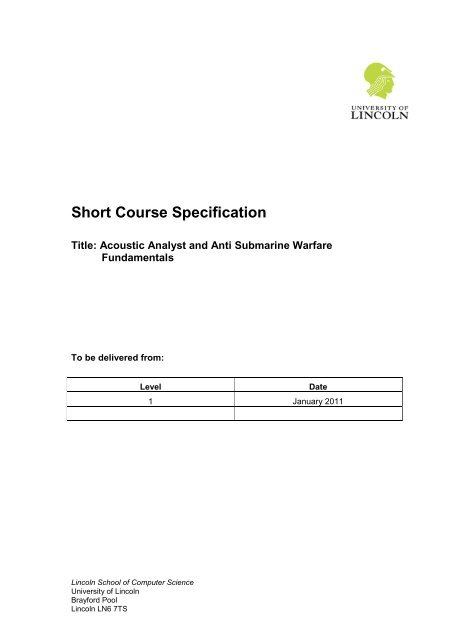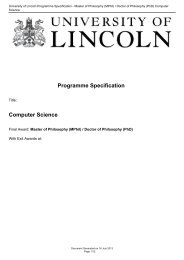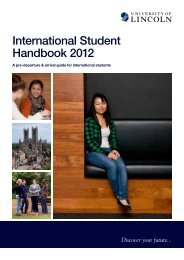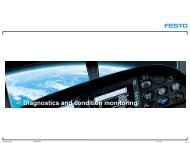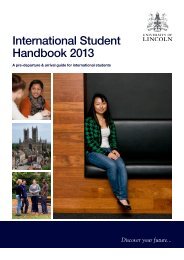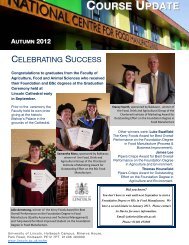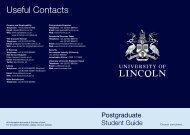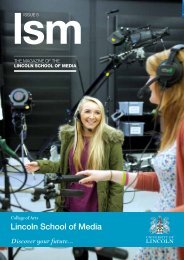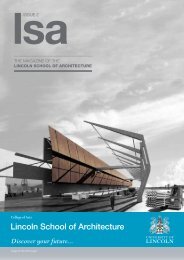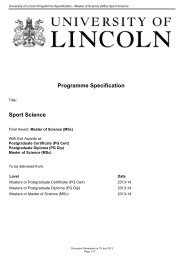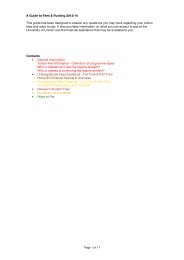Acoustic Analyst and Anti-Submarine Warfare Fundamentals (PDF)
Acoustic Analyst and Anti-Submarine Warfare Fundamentals (PDF)
Acoustic Analyst and Anti-Submarine Warfare Fundamentals (PDF)
- No tags were found...
You also want an ePaper? Increase the reach of your titles
YUMPU automatically turns print PDFs into web optimized ePapers that Google loves.
Short Course Specification<br />
Title: <strong>Acoustic</strong> <strong>Analyst</strong> <strong>and</strong> <strong>Anti</strong> <strong>Submarine</strong> <strong>Warfare</strong><br />
<strong>Fundamentals</strong><br />
To be delivered from:<br />
Level<br />
Date<br />
1 January 2011<br />
Lincoln School of Computer Science<br />
University of Lincoln<br />
Brayford Pool<br />
Lincoln LN6 7TS
Contents<br />
1. Basic Short Course Data<br />
2. Revisions to the Course<br />
3. Rationale for Provision<br />
3.1 Rationale <strong>and</strong> Marketing Summary<br />
3.2 Course Aims<br />
3.3 Resources<br />
3.4 Variations to St<strong>and</strong>ard Regulations <strong>and</strong> Guidance<br />
4. Short Course Outcomes<br />
5. Learning, Teaching <strong>and</strong> Assessment Strategies<br />
5.1 Learning <strong>and</strong> Teaching Strategy<br />
5.2 Assessment Strategy<br />
6. Short Course Structure<br />
7. Justification of Credit Level<br />
7.1 Justification of academic level<br />
7.2 Justification for credit points<br />
Appendix I – Module Specification(s)<br />
2
1. Basic Short Course Data<br />
This document describes one of the University of Lincoln’s programmes using the protocols required by<br />
the UK National Qualifications Framework as defined in the publication QAA guidelines for preparing<br />
programme specifications.<br />
This programme operates under the policy <strong>and</strong> regulatory frameworks of the University of Lincoln. The<br />
latest versions of all regulations <strong>and</strong> policies can be found on the Secretariat area of the Portal. Any<br />
areas in which delivery differs from these, including: Admissions, Assessment <strong>and</strong> Progression should<br />
be noted in Section 3.3.<br />
Title<br />
Subject<br />
Exit awards<br />
Other programmes<br />
sharing modules with this<br />
course<br />
<strong>Acoustic</strong> <strong>Analyst</strong> <strong>and</strong> <strong>Anti</strong> <strong>Submarine</strong> <strong>Warfare</strong> <strong>Fundamentals</strong><br />
Computer Science<br />
NONE<br />
NONE<br />
Mode of delivery Full time Part time X Distance<br />
Awarding body<br />
Teaching institution<br />
Campus<br />
Department/School<br />
Programme Leader<br />
University of Lincoln<br />
Lincoln School of Computer Science<br />
Brayford<br />
Lincoln School of Computer Science<br />
Kevin Jacques<br />
University Link<br />
Relevant QAA Subject Benchmark Statement(s)<br />
Professional, Statutory or Regulatory Body<br />
accreditation<br />
3
2. Revisions to the Programme<br />
Original Approval Date :<br />
Re-Approval Dates :<br />
Entry required when any change to this document are undertaken through Minor<br />
Modification<br />
Minor Modification Date Phased or immediate introduction of<br />
the change<br />
4
3. Rationale for Provision<br />
3.1 Rationale <strong>and</strong> Marketing Summary<br />
The University short course in <strong>Acoustic</strong> Intelligence <strong>and</strong> <strong>Anti</strong> <strong>Submarine</strong> <strong>Fundamentals</strong><br />
is a unique programme of a single m<strong>and</strong>atory taught module <strong>and</strong> is designed to bring<br />
together practitioners from a wide area of <strong>Anti</strong> <strong>Submarine</strong> <strong>Warfare</strong> (ASW) in a<br />
comprehensive academic programme. Student experience <strong>and</strong> prior learning in this field<br />
will be further developed utilising lectures, seminars <strong>and</strong> practical sessions, which will<br />
enhance <strong>and</strong> assist students working in the ASW sector.<br />
The <strong>Acoustic</strong> <strong>Analyst</strong> <strong>and</strong> ASW short course has been marketed extensively <strong>and</strong><br />
interest from the UK MoD <strong>and</strong> other international military organisations has been<br />
overwhelming. UK Trade <strong>and</strong> Industry (UKTI) approved countries include:<br />
• UK (Including Industry, MoD – serving / ex personnel)<br />
• Singapore<br />
• Malaysia<br />
• United Arab Emirates (UAE)<br />
• Germany<br />
• Saudi Arabia<br />
• Turkey<br />
• India<br />
• Kuwait<br />
• Oman<br />
• Qatar<br />
• Canada<br />
The programme is available to any applicants who are either currently serving military<br />
personnel, those who have recently left the armed forces or civilians who are employed<br />
in an associated relevant profession with an interest in gaining marketable educational<br />
qualifications in <strong>Acoustic</strong> Analysis <strong>and</strong> <strong>Anti</strong> <strong>Submarine</strong> <strong>Warfare</strong>. In line with previous<br />
EW courses offered by the University of Lincoln, all serving personel must be serving for<br />
forces approved by the UK MoD for partnership engagement.<br />
3.2 Course Aims<br />
The aims of this short course are to provide the new <strong>Anti</strong> <strong>Submarine</strong> <strong>Warfare</strong> student<br />
with the <strong>Fundamentals</strong> of <strong>Acoustic</strong> Analysis <strong>and</strong> <strong>Anti</strong> <strong>Submarine</strong> <strong>Warfare</strong> within the<br />
modern Operational Environment. The primary module is designed to be delivered over<br />
two phases. The first phase will provide the student with the fundamentals of Electronic<br />
<strong>Warfare</strong> (EW). The second phase introduces the student to <strong>Acoustic</strong> Analysis <strong>and</strong> <strong>Anti</strong><br />
<strong>Submarine</strong> <strong>Warfare</strong> (ASW).<br />
3.3 Resources<br />
Each student will be assigned a University of Lincoln mentor as well as taught,<br />
administred to <strong>and</strong> mentored by University of Lincoln approved MASS-Abacus skilled<br />
EW <strong>and</strong> ASW instructors, whose primary role will be to ensure that all of the students<br />
learning resource requirements are identified <strong>and</strong> catered for in a professional capacity.<br />
5
3.4 Variations to St<strong>and</strong>ard Regulations <strong>and</strong> Guidance<br />
NONE<br />
4. Short Course Outcomes<br />
• [LO1] define Electronic <strong>Warfare</strong>, examine the concept of the Comm<strong>and</strong> <strong>and</strong><br />
Control structure <strong>and</strong> demonstrate underst<strong>and</strong>ing of Strategic <strong>and</strong> Tactical Threat;<br />
• [LO2] demonstrate underst<strong>and</strong>ing of the dimensions of warfare <strong>and</strong> the<br />
Electromagnetic Spectrum;<br />
• [LO3] define <strong>Anti</strong> <strong>Submarine</strong> <strong>Warfare</strong> <strong>and</strong> recount the different methods of<br />
exploiting the Underwater Environment;<br />
• [LO4] describe the properties of Active Sonar <strong>and</strong> demonstrate how these<br />
properties could be used to classify a Sonar system;<br />
• [LO5] describe the properties of Passive Sonar <strong>and</strong> demonstrate underst<strong>and</strong>ing<br />
of the effects of ambient noise;<br />
• [LO6] compare the differences between employment of Active <strong>and</strong> Passive<br />
Sonar, describe occasions for use of each type of Sonar <strong>and</strong> consider Wideb<strong>and</strong>,<br />
Broadb<strong>and</strong> <strong>and</strong> Narrowb<strong>and</strong> theory;<br />
• [LO7] describe each of the five key elements to be considered when making<br />
Threat Assessments;<br />
• [LO8] in Passive Sonar, demonstrate underst<strong>and</strong>ing of Demodulated Noise<br />
(DEMON) <strong>and</strong> Low Frequency Analysis <strong>and</strong> Ranging (LOFAR) analysis<br />
techniques to enable classification <strong>and</strong> determine speed of a vessel;<br />
5. Learning, Teaching <strong>and</strong> Assessment Strategies<br />
5.1 Learning <strong>and</strong> Teaching Strategy<br />
The module will be delivered using a combination of lectures, workshops, <strong>and</strong> teacher<br />
led assignments <strong>and</strong> demonstrations as a means of developing the required knowledge.<br />
Deeper underst<strong>and</strong>ing <strong>and</strong> skill development will be facilitated through workshops <strong>and</strong> a<br />
coursework project. Students will be required to undertake <strong>and</strong> submit developmental<br />
assignments to demonstrate their perception of the Learning Outcomes.<br />
5.2 Assessment Strategy<br />
The assessment strategy adopts the use of both practical based assessments, in-class<br />
tests <strong>and</strong> a written assessment.<br />
6
6. Short Course Structure<br />
The short course consists of a single 60 CAT Point module.<br />
Table 1 Course Structure<br />
Level 4 / C AA <strong>and</strong> ASW<br />
<strong>Fundamentals</strong><br />
Level 5 / I<br />
Level 6 / H<br />
Level M<br />
Table 1 Course Structure illustrates the module composition of the Short Course in<br />
<strong>Acoustic</strong> <strong>Analyst</strong> <strong>and</strong> <strong>Anti</strong> <strong>Submarine</strong> <strong>Warfare</strong> <strong>Fundamentals</strong>.<br />
For details of each module contributing to the Short Course, please consult the<br />
individual module specifications.<br />
7. Justification of Credit Level<br />
7.1 Justification of academic level<br />
This short course addresses key fundamental skills that underpin the subject area of <strong>Anti</strong><br />
<strong>Submarine</strong> <strong>Warfare</strong>. The module learning outcomes are specifically level 1 in nature <strong>and</strong><br />
character.<br />
7.2 Justification of credit level<br />
Based on notional levels of 10 hours per CAT credit point, this short course is designed to<br />
operate across a 16 week period <strong>and</strong> mixes formal teaching nominally across a four week<br />
period followed by supported independent study.<br />
7


